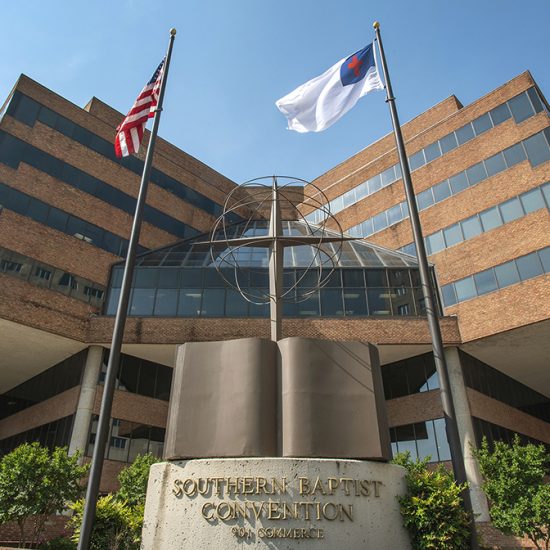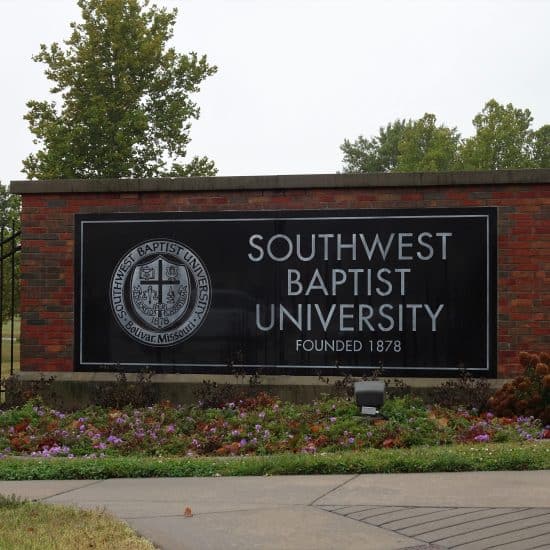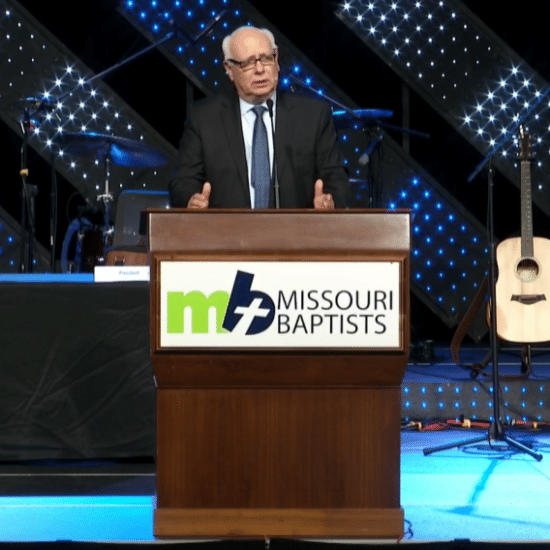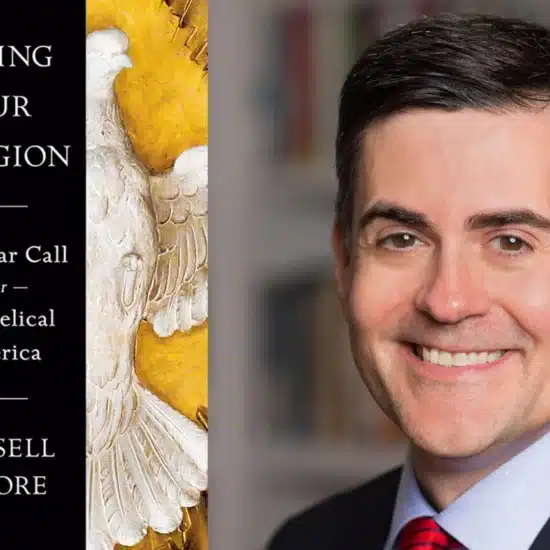
“Let’s say somebody defames your character with unfounded gossip. The legal things to do — and I’m not just talking about a lawsuit, I mean the understandable, natural thing to do might be to defend your name. The godly thing might be: Let it go.”
With these words, Mike Stone of Emmanuel Baptist Church in Blackshear, Georgia, urged his congregants to “stop airing your dirty laundry” as he preached on Paul’s admonition against suing fellow Christians in 1 Corinthians 6.
“That which is godly should be our pursuit even over that which is legal,” Stone added in his 2018 message.
That sermon resurfaced last week in a Religion News Service article by Bob Smietana after a pastor sued Russell Moore, former president of the Southern Baptist Convention’s Ethics & Religious Liberty Commission. The pastor suing for defamation and related claims was none other than … Mike Stone of Emmanuel Baptist Church in Blackshear, Georgia.
Stone narrowly lost the SBC presidential race in June as the candidate of the Conservative Baptist Network, which perceives the SBC as too liberal (no, that’s not a typo). Stone apparently blames Moore for the election loss after some letters Moore wrote were leaked and exposed problematic behavior by Stone. So, Stone wants $750,000 from Moore for alleged defamation, invasion of privacy, and intentional infliction of emotional distress.
Let’s put aside the question of whether Stone lost the presidency because someone exposed his bad behavior or precisely because of that behavior. And let’s put aside the fact that Moore wrote his letters in response to Stone first attacking Moore and launching an investigation of Moore’s tenure at the ERLC. Even ignoring all that, the contradiction remains between what Stone preached and what he now practices.

Rev. Mike Stone. (Brauda Studios/Religion News Service)
Stone’s 16-page lawsuit brings to mind the overly-litigious society in which we live. Conforming to these norms, lawsuits often emerge during power struggles within Christian groups. They are even filed by leaders like Stone who claim to believe the Bible is literally true but somehow overlook the plain language of Paul’s letter.
In this issue of A Public Witness, we’ll brief you on some of these lawsuits. We’ll also litigate the impact of such legal actions on the ability of Christians to effectively proclaim the good news of Jesus Christ.
Prayers for Relief
Analysis of the cost and compensation paid into our tort system suggest such civil litigation accounts for 2.3% of the U.S.’s gross domestic product — about $429 billion. This far exceeds that of other nations. We’re not quite a nation of lawyers — though we are largely governed by them — but we do trust in our attorneys more than other societies do.
Christians aren’t immune to this litigious reflex. Some almost want to sue first and then figure out the facts later. Last year, one of us (Brian) tweeted criticism of a “Christian” radio personality for offering misleading information about COVID-19. The tweet also referenced the person’s previous dismissal from media outlets for shoddy reporting.
The person’s response was to request, in a tweet and an email, the name of Word&Way’s lawyer since he planned “on taking legal action against you as well as Word and Way” for alleged “defamatory comments.” Confident of our accuracy and First Amendment protections, the threats went ignored on our end. The person never contacted us again, though by blocking us on Twitter he prevents us from reading and correcting any misinformation he continues to spew in 280 characters or less.
Unfortunately, the threats aren’t always merely rhetorical. In 2002, the Missouri Baptist Convention sued Word&Way and four other ministry organizations. Neither of us worked for the ministry at the time, though at the 2002 MBC annual meeting Brian made an unsuccessful motion to end the litigation that had started just two months earlier. Had the motion succeeded, it would’ve prevented a 17-year legal fight that consumed an unknown amount of mission dollars and energies, while also prompting numerous headlines in secular news outlets about mean Christians suing each other.

Numerous other examples of litigious Christians come to mind. Consider how Lifeway Christian Resources last year sued its former CEO after he inked a book deal with a different publisher. Some Lifeway trustees cited 1 Corinthians 6 to express their opposition to the suit filed by their new leader. The legal dispute was quickly resolved, but it raises questions about how much time a Bible publisher actually spends reading the Bible.
Other legal disputes over power and money also occurred in recent years among ministries. Like a lawsuit filed earlier this year over a dispute about the election of elders at McLean Bible Church in Virginia. Or a 2018 lawsuit filed by Harvest Chapel Church in Chicago against a reporter and two bloggers (and their wives) for reporting on alleged financial mismanagement and leadership problems. And, of course, a lawsuit filed last year by Jerry Falwell Jr. against Liberty University that alleged they defamed him by forcing him to resign after allegations of inappropriate behavior.
Each of these suits gained attention with unbelievers — exactly the thing Paul warned about in 1 Corinthians.
Legalistic Interpretations
More progressive-minded Christians like to chastise their fundamentalist cousins for being overly legalistic in interpreting the Bible. Their critique is that narrow and rigid readings of scripture offered by so-called “literalists” neglect the nuance of historical meaning and contemporary application, while leaving little room for the Spirit to move or God’s grace to operate.
In this instance, legalism cannot be avoided because the text in question is about how Jesus’s followers should approach the legal system. Despite professing unwavering allegiance to biblical principles, modern Christians often find themselves squaring off in civil litigation. Like the Bible’s teachings on divorce, the admonition to avoid such fights in 1 Corinthians 6:1-11 is dismissed by many as archaic and therefore impractical. Is this passage truly irrelevant now?
Besides knowing that the Christians in Corinth were a difficult bunch that warranted multiple letters of moral guidance from the Apostle Paul, little is understood about the specifics of these legal disputes. One hint from verse 3 references that the contention involved “ordinary things” (NRSV) or “things of this life” (NIV). Why do such concerns so outrage Paul that he claims the mere presence of the lawsuits means these quarrelsome Christians “have been completely defeated already” (v.7)?
One leading interpretation focuses on the legal action as a lack of discipleship. In resorting to the courts of their day, these Christians were failing to follow Jesus by resolving their conflicts within the community. Yet, this response only begs another question: Why did turning to the legal system compromise their Christian witness?
Noted New Testament scholar Richard Hays explained, “The overwhelming majority of civil cases were brought by the wealthy and powerful against people of lesser status and means. The judges themselves were members of the privileged classes and would ordinarily give preference to the testimony of their social peers against the testimony of those of lower rank.”
Similarly, early Christianity scholar Bruce Winter pointed out that people of lower rank, despite often being the targets of litigation in Corinth, couldn’t even bring charges against anyone themselves. He also noted how unjust decisions plagued the court systems since bribes and unequal standards about who counted as a witness influenced the outcomes.

Thus, it is safe to assume that those filing the lawsuits often enjoyed higher economic and social status relative to their adversaries. In seeking a remedy through the pagan court system, these Christians were simultaneously violating the boundaries of community life and perpetuating the very injustices challenged by the witness of the Gospel.
“There are no winners: the whole church loses, and the individuals involved lose, even if they win their cases,” added Hays. “Why? Because by fighting it out in the law courts, they become the perpetrators of wrongdoing.”
There is a common thread to the critique of Paul and these scholarly commentators. The Body of Christ is structured by an alternative set of values, which conflict with those of worldly powers and empires. Seeking legal remedy to triumph in a disagreement corrupts both the parties involved, along with the entire church, by legitimatizing and extending the empire’s reign that stands in opposition to proclamation of Jesus as Lord. The early Christians in Corinth failed this test of loyalty.
Understanding this background of the text informs how we interpret it today. Too often, this passage is quickly cited as an excuse to cover up injustice, especially when it comes to clergy misconduct or sexual abuse within the church. Paul’s admonition, as conveyed through Hays and Winter, was that the court increased oppression rather than rectifying it.
When Mike Stone, Jerry Falwell Jr., or other prominent Christians today leverage litigation to protect or expand their positions of power, they are acting akin to the Corinthians criticized by Paul. In contrast, when victims of abuse and their advocates use the courts to force accountability, they are trying to even the scales of justice.
The pursuit of legal action is not inherently good or bad. That moral judgment is determined by the violations done to human dignity, the power differentials of those involved, and whether the courts are used to exacerbate what is wrong or advance what is right in the eyes of God.
Get cutting-edge analysis and commentary like this in your inbox every week by subscribing today!
Legal Epidemic
While Paul wrote about lawsuits between believers, there are other types of lawsuits involving Christians that also created headlines over the past year. During the COVID-19 pandemic, most churches, businesses, and other places voluntarily shut down and adopted public health measures like social distancing and mask wearing. Even in places where governmental officials didn’t restrict religious services, most churches went online early in the pandemic and came back carefully with CDC-recommended precautions.
A few congregations, however, offered defiant responses to the expectation that they love their neighbors. Some pastors even led their churches to sue government officials to demand a special pandemic privilege for religion.
Although many of these “religious liberty” lawsuits failed in the first several months of the pandemic, later ones found traction after the U.S. Supreme Court shifted on the issue when Justice Amy Coney Barrett replaced the late Justice Ruth Bader Ginsburg. Once restrictions on religious gatherings came under increased scrutiny — even where rules treated religious gatherings just like other mass assemblies — local governments across the country started settling cases with churches to put the litigation behind them and avoid a potentially bigger loss.
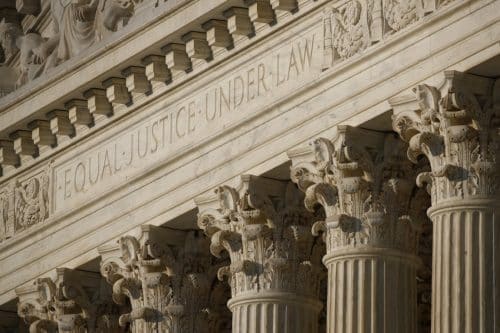
U.S. Supreme Court building in Washington, D.C. (Patrick Semansky/Associated Press)
Rev. John MacArthur’s megachurch, Grace Community Church in Sun Valley, California, won $800,000 from governments in a settlement after suing to demand an exemption from health restrictions that MacArthur openly flouted. While the church ignored the health measures last winter, MacArthur and his wife were part of a COVID outbreak within the congregation.
Capitol Hill Baptist Church, a large congregation in the nation’s capital led by Rev. Mark Dever, won $220,000 in a settlement despite the restrictions against them holding mass gatherings had been lifted months earlier. The church had avoided D.C. rules by instead meeting across the line in Virginia where fewer restrictions on mass gatherings existed.
A similar dynamic played out with Abundant Life Baptist Church, a megachurch in Lee’s Summit, Missouri, that won $146,750 even though local restrictions applied the same standard to churches as other mass gatherings. The church instead insisted it should be treated like a bar or hair salon (because those are the first places that come to mind when we think of a Baptist church).
While most churches across the country listened to the COVID health recommendations about mass gatherings, some conservative churches like these three (and some others that also won payments from their litigation) fought against measures designed to save lives. And some, like MacArthur, openly broke the government rules and saw COVID cases sweep through their congregations. Having first added to the problem, these churches are now reaping rewards for their misbehavior.
Help sustain the ministry of Word&Way by subscribing to A Public Witness!
Moral Hazards
There’s a simple concept in economics related to this: moral hazard. The basic idea is that shielding people (or organizations) from the costs of risky behavior actually incentivizes them to engage in more of it.
This was the conundrum facing financial regulators back in 2008. Large banks, insurers, and other firms faced bankruptcy because of their bad decisions. Letting them go under appeared just. This would be the free market delivering a harsh but clear lesson that would chasten actors in the future. Yet, allowing them to go under would cause severe damage to the broader economy, inflicting harm far beyond those on the losing side of complex financial transactions.
Critics of plans to “bail out” the banks argued that instead of solving the problem, such a rescue would only make things worse. The federal government coming to their aid would signal some entities were “too big to fail.” Knowing this, those firms would act in even riskier ways because they would reap any positive benefits (i.e. big profits) but the serious consequences (i.e. huge losses threatening their existence) would be borne by taxpayers. The drama ended with bailouts, new regulations, and the fear that history will inevitably repeat itself.
Churches like John MacArthur’s that refused to follow common sense and public health orders create moral hazards of a different type. The payments they prominently received rewarding their obstinance will undoubtedly incentivize other pastors wanting to make provocative political statements to engage in similar behavior in the future. MacArthur’s case demonstrates that acting against the common good can result in significant attention and substantial reward. It is a strategy many may emulate.
Furthermore, the payments these congregations received came from public coffers. While many conservative Christian pastors are quick to denounce government programs and decry those “dependent” upon the state, the churches refusing to abide by generally-applicable public health orders during the pandemic are now receiving government funds with taxpayers footing the bill. Their refusal to sacrificially serve the needs of all perversely ends with them financially benefiting at the expense of everyone else.
The payments in these settlements don’t create a merely theoretical problem. That money now can’t be used for other community purposes. Consider, for instance, the church in Lee’s Summit. The payment will come from the local county government and from a local hospital system that runs the county’s health department. Reflect for a minute on what that money cannot be spent on now for the community. What does it say about the church’s priorities? What will it signal when other needs go unmet?
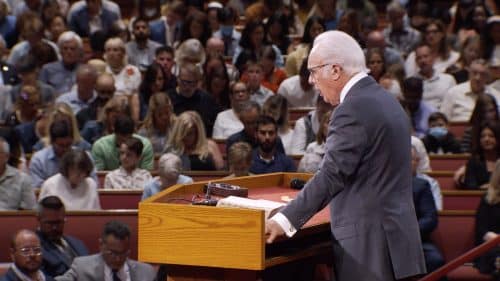
Rev. John MacArthur speaks at Grace Community Church in Sun Valley, California, on July 26, 2020, during a service held in violation of local COVID health measures. (Religion News Service screengrab)
Don’t miss the next issue of A Public Witness. Sign up today!
To Sue or Not to Sue
That is not the question. When we adopt the standards of our culture, it’s easy to find ourselves as adversaries in court. But the context of the Corinth situation means that we cannot say there is no time when a Christian can go to court.
Mike Stone, back when he preached against suing for defamation, noted that Paul’s argument didn’t apply to criminal courts. Thus, Christians should report crimes instead of trying to keep those hidden in the church family. And he said there could be times for civil litigation, including divorce with biblical cause.
We would also emphasize a number of times when Christians could in good faith go to court, such as to stop those guilty of sexual misconduct, to end abuses of power, or to expose financial fraud. We’re not going to get legalistic here and try to draw a clear line of when Christians can or cannot sue.
Rather, we think it’s important to look at the big picture. After all, that’s what Paul was doing. He was concerned about injustices, breaking relationships, destroying community, and damaging the church’s witness. If we get focused on the legal hairsplitting of 1 Corinthians 6, we miss the whole point.
Just because we have the right to sue doesn’t make it right.
Many times the cost of litigation outweighs the benefits. And by cost we don’t merely mean paying your attorney. The larger question is about the harm done to the Christian message by adjudicating ego-driven conflicts.
We’re not lawyers, which means none of this should be considered legal advice (although we have watched some episodes of Law & Order). However, it seems Mike Stone’s lawsuit is unlikely to prevail. Meeting the standards of defamation is difficult. Stone’s claims appear suspect. We could insert a cautionary pun here about those in glass houses not throwing, well, but we won’t go there.
Our complaint is the damage Stone’s suit does to the Gospel message. This lawsuit speaks louder and reaches farther than all the sermons he’s preached. It proclaims a clear message about seeking power at all costs. That lesson stands in sharp contrast to the cross, where Jesus gave up all power and paid the ultimate price.
As a public witness,
Brian Kaylor & Beau Underwood
P.S. We’re not raising money for a legal defense fund (yet), but if you want to support the ministry of Word&Way, which makes analysis like this possible, then click here to make a donation and upgrade to a paid subscription of A Public Witness if you’ve not yet done so.

